SAILING. VOR2012, Leg 7 Day 1 – The Volvo Ocean Race fleet headed out of Miami and straight towards a tropical storm on Sunday after making a slow start to Leg 7, potentially one of the most critical stages of the 39,000 nautical mile marathon.
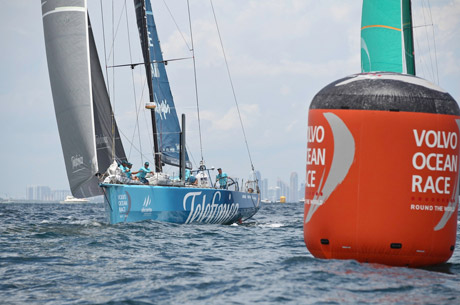
Team Telefonica, skippered by Iker Martinez from Spain just about to round mark 2 during the start of leg 7 from Miami, USA to Lisbon, Portugal, during the Volvo Ocean Race 2011-12. (IAN ROMAN/Volvo Ocean Race)
With a gentle breeze blowing off Miami’s famous South Beach it was Ian Walker’s Abu Dhabi Ocean Racing, winners of Saturday’s PORTMIAMI In-Port Race, who lead around the six-mile course, although by the time of the 1900 position report overall leaders Team Telefónica held the slimmest of advantages.
The boats were headed out into the North Atlantic where the first major obstacle they will face will be Tropical Storm Alberto, the first of the 2012 hurricane season, lying off the east coast of the United States and holding winds of up to 45 knots at its centre.
Points have never been more crucial as the race reaches a critical juncture with the 3,590nm leg from Miami to Lisbon, Portugal.
After more than six months and thousands of miles of extreme racing, Telefónica still lead with 165 points but Groupama are snapping at their heels just seven points behind on 158, while CAMPER with 152 and current form team PUMA on 151.
Following their Miami in-port win, their third of the inshore series, Abu Dhabi started the leg fired up for battle, while Team Sanya were relishing being back alongside their rivals after pulling out of Leg 5 with boat damage and sitting out Leg 6.
The formation of Tropical Storm Alberto may have put an end to the traditional route up the coast using the Gulf Stream as a catapult but it will reward the teams with fast sailing in decent breeze if they play it correctly. Get it wrong, and they could quickly find themselves in dangerous conditions.
Navigator Tom Addis, mastermind of PUMA Ocean Racing powered by BERG’s back to back leg wins, said the race to pick up the winds generated by Alberto could prove critical in the bid to get an early advantage.
“The storm is the source of pressure for us to get north and east on so it’s important to try to feed into that pressure first,” he said.
“You don’t want to be the wrong side of that low because the current against wind in the Gulf Stream would give quite a heinous sea state. It looks like there will be plenty of good downwind in the next leg, a reasonably fast leg, which we always enjoy.”
Abu Dhabi navigator Jules Salter said he hoped to use the weather system to fire them into the Atlantic Ocean.
“In some ways it’s quite good – it’s giving us some downwind conditions once we get up past Cape Canaveral and up towards Cape Hatteras so we’re kind of cutting the corner and probably sailing a more direct route that we would have done if the storm wasn’t there.
“It’s quite light for the first part of the forecast so it will be about finding wind in the first 48 hours. The closer we can get to it the better – it will give us a bit of a catapult out of the way.”
After the disappointment of finishing last in the PORTMIAMI In-Port Race, Telefónica navigator Andrew Cape said his team were looking forward to getting back to rediscovering the form which saw them win the first three offshore legs.
“We’re an offshore boat, an offshore team, and yeah, sure we had a bad day yesterday but that was yesterday and we’ll just get on with it,” he said.
Volvo Ocean Race meteorologist Gonzalo Infante said the key to early success depended on how well the teams use Tropical Storm Alberto.
“The fleet face a tricky first few hours of the race in light, unstable winds while trying to maximise the effects of the Gulf Stream,” he said.
“The first boat to reach the lower part of Tropical Storm Alberto will stretch their lead but the big question facing the fleet is how close to the centre of the system to go. Winds are forecast to hit 45 knots, which are no good for anything apart from breaking boats. This storm needs to be treated with plenty of respect.”
Leg 7 is expected to take around 11 days to complete.
Volvo Ocean Race
www.volvooceanrace.com
May 20, 2012 - 1930 UTC
TEAMS HIT SCREAMING SPEEDS AS STORM OFFERS KEY TO VICTORY
SAILING. VOR2012, Leg 7 Day 2 – Boat speeds rocketed on Monday as the Volvo Ocean Race fleet flirted with Tropical Storm Alberto, the weather system that could hold the key to a rapid, unorthodox transatlantic crossing.
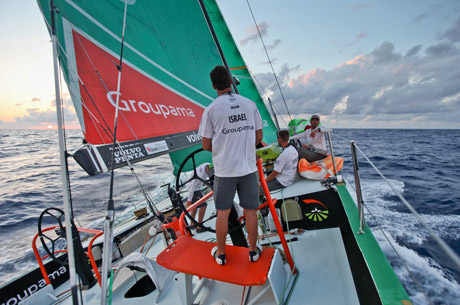
Erwan Israel helming Groupama Sailing Team as they beat upwind, during leg 7 of the Volvo Ocean Race 2011-12, from Miami, USA to Lisbon, Portugal. (Yann Riou/Groupama Sailing Team/Volvo Ocean Race)
Fleet-wide speeds were into the high 20s as the teams careered north-east towards the tropical storm, the first of the 2012 hurricane season, and the key to early success in the 3,590-mile sprint to Lisbon, Portugal.
At its centre, Alberto holds gale-force winds of 35 knots but the teams will likely try to exploit the lesser, more favourable breeze further from the eye of the storm that could catapult them across the Atlantic.
Groupama sailing team were leading the charge at 1300 UTC having gybed to the north-east first, with an eight-mile advantage of over PUMA Ocean Racing powered by BERG as less than 20 miles split the fleet.
"There have been a few key moments so far and we’ve been in a position to dictate where we wanted to go, and the fleet are doing a similar thing behind us," Groupama watch captain Damian Foxall said.
"It’s a good position to be in. We’re the first one to gybe and we’re the first to be going in the right direction towards Lisbon at speed. So long as this keeps up, things are looking good.”
Just 14 points separate leaders Team Telefónica from fourth-placed PUMA in the overall standings and with 30 points on offer to the winners of each of the remaining three offshore legs that lead could easily be swallowed up.
Telefónica finished off the podium for the first time in an offshore leg in the race into Miami and made matters worse by taking last place in Saturday’s PORTMIAMI In-Port Race.
Still, MCM Diego Fructuoso said team spirit was good as they bid to hold off Groupama, seven points behind them in second, as well as CAMPER with Emirates Tea New Zealand, a further six points back, and PUMA, just a point behind them.
“The atmosphere is really good, which is not easy after the recent results,” said Fructuoso. “We're going to give it everything in this leg, as we want to arrive in Lisbon in first place and show we haven't forgotten how to win."
After winning the PORTMIAMI In-Port Race and leading around the inshore section of the Leg 7 start, Abu Dhabi Ocean Racing were looking strong until a large plastic bag wrapped around their keel hampered progress.
But skipper Ian Walker said they were well matched against PUMA and CAMPER with Emirates Team New Zealand and enjoying the tussle for third.
“They are both right next to us,” Walker said. “I was just on deck and we can see them clearly.
“We dropped back into the pack in the upwind conditions soon after the start but now we are holding them as we get into down wind sailing.”
Volvo Ocean Race weather expert Gonzalo Infante said although the North Atlantic weather systems are unstable, the option to ‘cut the corner’ and sail a non-traditional route almost in a straight line to Lisbon could be opening up to the teams.
“A new low pressure system forming further north is set to swallow up Tropical Storm Alberto and force the huge high pressure system that blocks the path to Lisbon to the east,” he said.
“A cold front associated with the low pressure will bring wind, allowing the teams to sail a much more direct route. The door is definitely open – but timing is everything.”
Volvo Ocean Race
www.volvooceanrace.com
May 21, 2012 - 1300 UTC
CREWS CATCH THEIR BREATH AS LIGHTER WINDS COMPRESS THE FLEET
SAILING. VOR2012, Leg 7 Day 3 – A semblance of normality returned to the fleet on Tuesday after 24 hours of chaotic action for the teams as they fought to second guess the volatile tropical storm Alberto.
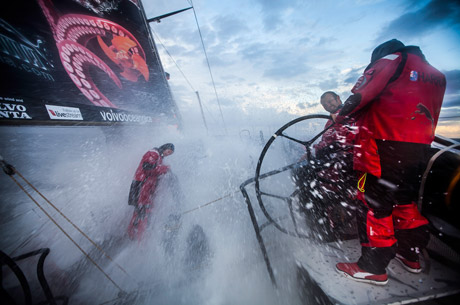
Kelvin Harrap putting PUMA Ocean Racing powered by BERG through it's paces, during leg 7 of the Volvo Ocean Race 2011-12, from Miami, USA to Lisbon, Portugal. (Amory Ross/PUMA Ocean Racing/Volvo Ocean Race)
Franck Cammas’ crew on Groupama read the weather scenario to perfection at the start of Leg 7 from Miami to Lisbon, gybing away from the storm earliest before setting off on a blistering downwind ride to the east.
Soon after, the skittish Alberto made a sudden move to batter the remaining five boats with several hours of strong headwinds, huge waves and lightning storms.
Having at one point built a lead of nearly 70 nautical miles, this morning Groupama’s advantage was down to 22 nm, as the chasing pack, led by PUMA Ocean Racing powered by BERG, emerged bruised but unbowed from Alberto’s clutches.
At 1300 UTC Groupama sailing team were 18 nm ahead as the leg leaders slowed in softening winds which looked likely to re-compress the fleet over the coming day.
Despite closing down Groupama, Ken Read’s second placed PUMA were also having to fight to hold off Iker Martínez’s Team Telefónica, the overall race leaders, just seven nautical miles back.
Four nautical miles astern and also eying up a chance to break into the top three were Abu Dhabi Ocean Racing, Chris Nicholson’s CAMPER with Emirates Team New Zealand and Mike Sanderson’s Team Sanya -- all grouped within 12 nm of each other.
Abu Dhabi skipper Ian Walker explained how the entire fleet, minus Groupama, were caught out.
“We were trying to ride the extra wind just to the south of it but a violent wind shift headed us straight into the eye of the storm," said the Briton.
“There then followed a chaotic 12 hour period as we ended up on the wrong side of it beating upwind in 35 knots. All of a sudden instead of a fast ride east to the south of the storm we were right in it and in survival mode with three reefs and a heavy weather jib.
"We came off some terrible waves but most worrying of all was the lightning. crashing all around right down to the water. It didn’t seem possible our carbon mast could avoid a direct strike."
CAMPER went on to suffer most from Alberto’s effects, surviving the battering before tumbling from second to fifth after becoming trapped in light winds near the storm’s centre.
"At one point we lost 25 nm in one sched,” said skipper Chris Nicholson. “What was worse was that PUMA and Telefónica, who were behind us, saw us get swallowed up by one very bad cloud and were able to take the high road up and around it.”
“It’s frustrating but everyone on board knows how easily these sort of things happen. Now we are clawing back some of those miles and we just need to stay in touch enough and wait for another opportunity.”
CAMPER navigator Will Oxley was similarly philosophical and said the team had already refocused on the next meteorological hurdle to be faced.
“The rest of us were a bit slow in gybing across and are now playing catch-up," he said. “Now, the main thing is that we need to pick up the (next) front developing to the east -- otherwise Groupama will get a real jump on everyone. It’s going to be an interesting leg.”
Sanya skipper Mike Sanderson described Alberto as "a pretty nasty low pressure".
"We saw up to 40 knots upwind and some horrendous rain and hail," added the New Zealander. "It was very tricky, very tough on the guys, no sleep -- from the beautiful organisation of Miami to total chaos on the first day.”
At the head of the fleet, Cammas said he was delighted with his crew’s performance since leaving Miami.
“Things have been going well for us since the beginning of the leg,” Cammas commented. “We did well in the tropical storm by gybing before we got trapped. Thanks to that we avoided the unstable area in its middle.”
However, Cammas said Groupama’s jump on the fleet was likely to continue to be eroded as they encountered a light air zone over the next 24 hours.
The weather forecast for the next hours indicates the wind is dropping a lot,” he said. “We hope that it won’t be a total calm as the ones behind still have good wind and are coming back on us.
“The fleet will compress for sure, unfortunately,” he added.
Just 14 points separate the leading four teams in the overall standings with three offshore legs to complete. Telefónica have 165 points, followed by Groupama on 158, CAMPER on 152 and PUMA on 151.
Volvo Ocean Race
www.volvooceanrace.com
May 22, 2012 - 1300 UTC
GROUPAMA AND TELEFÓNICA NECK AND NECK AS CRITICAL DECISIONS LOOM
SAILING. VOR2012, Leg 7 Day 4 – Overall race leaders Telefónica were breathing down the neck of Leg 7 frontrunners Groupama on Wednesday following an exceptional 24 hours that saw them knock 25 nautical miles off the French team's advantage -- while further back in the fleet, CAMPER were among teams eyeing up a drastic change in course.
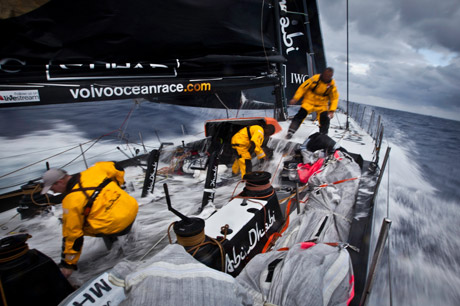
Reaching with waves crashing over the deck, onboard Abu Dhabi Ocean Racing during leg 7 of the Volvo Ocean Race 2011-12, from Miami, USA to Lisbon, Portugal. (Nick Dana/Abu Dhabi Ocean Racing/Volvo Ocean Race)
After overhauling PUMA Ocean Racing powered by BERG, Iker Martínez’s Telefónica snuck up on Groupama, leaders of the 3,590-nm leg to Lisbon since day one, and at 1300 UTC just 3.8 nm split the two.
“We are doing pretty fast angles and speeds so right now it is all good,” said Martínez, who led his team to victory in the first three offshore legs. “We are sailing very well and we are comfortable in these conditions.”
The teams had hoped for a direct path to Lisbon, away from the more traditional route high into the North Atlantic to dodge the Azores High, a huge high pressure system that sits in the centre of the ocean.
But unstable weather conditions ahead could see the teams cut their losses and head north on a more customary route as far north as Canada.
Martínez said the decisions made in the next 36 hours could prove vital to long-term success as they approach light winds.
“Probably the most important decision will come in the next day and a half when we approach the light air and the high pressure,” he added. “That’s when all the boats will make their big moves. We will have to think about how to position for that and that is going to be the most interesting moment for sure.”
Telefónica hold a seven-point lead over Groupama at the top of the overall standings, with CAMPER and PUMA also well within striking distance respectively 13 and 14 points off the pace with three offshore legs to complete.
While the frontrunners made plans to avoid the light airs ahead, CAMPER with Emirates Team New Zealand, who dropped from second to fifth at the hands of Tropical Storm Alberto which engulfed the fleet on Tuesday, were considering a radical break to the north.
“The routing is showing two quite dramatically different solutions right now,” navigator Will Oxley said.
“If you are slow you need to bug out now and go well north to get above the high pressure that’s coming in from Canada. If you are fast enough you can slip through to the Azores High and play the edge of that with the front.
“So that is the dilemma right now. We just got a weather file in that suggests we should bug out and go north, so I am going to analyse that a bit further.”
After stealing third place from PUMA Ocean Racing powered by BERG, winners of legs 5 and 6, spirits were high on Abu Dhabi Ocean Racing as they fixed their sights on Telefónica.
“It has been a very good 36 hours for the team on Azzam,” skipper Ian Walker said. “Our move to the north paid good dividends and for a while we were in sight of Telefónica and took third place in the standings from PUMA.
“Sadly Telefónica have again demonstrated their pace to us by sailing away from four miles in front of us to 22 miles in the last 24 hours. Once again we will have to be patient and hope that an opening happens later in the leg for us to get back at them.
“It looks like a day or two of drag racing before the weather throws the next curve ball our way.”
Volvo Ocean Race
www.volvooceanrace.com
May 23, 2012 - 1300 UTC
TELEFÓNICA EXTEND LEAD AS POTENTIAL SPLIT LOOMS
SAILING. VOR2012, Leg 7 Day 5 – Overall race leaders Team Telefónica extended their Leg 7 advantage to nine nautical miles on Thursday, as a pair of high pressure systems threatened to create a north-south split in the fleet.
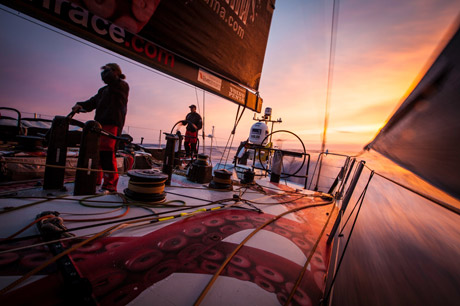
A rare North Atlantic sunset highlights Michi Mueller and Kelvin Harrap , onboard PUMA Ocean Racing powered by BERG during leg 7 of the Volvo Ocean Race 2011-12, from Miami, USA to Lisbon, Portugal. (Amory Ross/PUMA Ocean Racing/Volvo Ocean Race)
However at 1300 UTC both Telefónica and second placed Groupama were being closed down by rapidly charging third and fourth placed Abu Dhabi and PUMA, 18 and 21 nautical miles (nm) behind respectively. Fifth placed CAMPER were the biggest gainers, taking 41 nm out of their distance to lead total. Sixth place team Sanya also closed up significantly, moving to within 66 nm of the lead.
Having missed an opportunity to hook into an easterly moving cold front, the crews now have no option but to head north to swerve around the semi-permanent Azores High weather system, Race meteorologist Gonzalo Infante said.
The split could come as the teams negotiate a new high pressure that is also moving east from Newfoundland, with PUMA Ocean Racing powered by BERG, CAMPER with Emirates Team New Zealand and Team Sanya looking more likely to choose the northerly option, skirting closest to the ice exclusion zone put in place by the race organisers.
“They will likely head around the top of the new high, mostly in downwind conditions,” Infante said, adding that Telefónica, Groupama sailing team and Abu Dhabi Ocean Racing were more likely to stay south and sail upwind through the bottom of the high before the boats converged again in around five days' time.
Telefónica navigator Andrew Cape said that given the unpredictability of the weather, the Spanish team had been focusing primarily on maximising their boat speed.
“It’s been a funny old weather pattern out here,” Cape said. “It’s been pretty patchy, so we’ve just sailed the boat as hard as we could.
“We did have to do a lot of sail changes. I don’t think there was a watch where there wasn’t a sail change, but the guys are just so keen to do whatever it takes to get to the front and they’ve been rewarded for that. It’s all good news.”
Cape said the coming days could easily undo all their good work but declared himself content with their positioning.
“There’s too many little tricks up ahead to know what’s going to happen but we’ll keep pushing, and we’re very happy,” he said. “It will be very interesting. We’re certainly where we want to be and hopefully it will all come together from here."
Team Sanya watch captain Richard Mason believes the northerly option to be the safest route through the high pressure systems and expects his team to head that way for around a day and a half to avoid the clutches of the light wind zone.
“There was a chance that on the easterly route we’d have been able to nip through the high, but that chance disappeared,” Mason said. “So now we have to find a safe way to get north, wait for the high to redevelop and scoot round the top of it. Anyway, that’s what we think is going to happen.”
Mason said the Sanya crew welcomed the onset of unstable conditions which could give them a chance to steal a march on the fleet from behind.
“It does present plenty of options and we have managed to pull a few miles back on the guys in front which is always heartening,” he said.
“We don’t see the forecast as a problem as such as it creates a lot of opportunities. We just need to pick our way through and turn them to our advantage.
“The guys at the front are constantly looking over their shoulders and will be looking to cover one another. They’re not going to be too worried about us if we go off in a different direction and bang the corner.”
Abu Dhabi skipper Ian Walker said hopes of a direct route to Lisbon had now evaporated with the arrival of the new high pressure from the north.
“It was a dream scenario -- a very direct and downwind route that avoided the ice gates to the north,” Walker said. “Sadly, reality is now being faced by the fleet as we gybe north one by one.
“Ahead of us we face a very light wind high pressure zone to cross, a day of upwind sailing, much colder temperatures and a few more days at sea.”
Walker said there could well be a leg leaderboard reshuffle coming.
“I suspect we could see a real shake up in the standings with some big gains and losses,” he said. “The navigators and skippers will have their hands full as this tricky and rapidly evolving weather unfolds in front of them.
“All of a sudden Lisbon feels a lot further away from us than it did 24 hours ago.”
Latest estimates have the leading boats arriving in Lisbon on or around May 31.
Volvo Ocean Race
www.volvooceanrace.com
May 24, 2012 - 1300 UTC

| 

